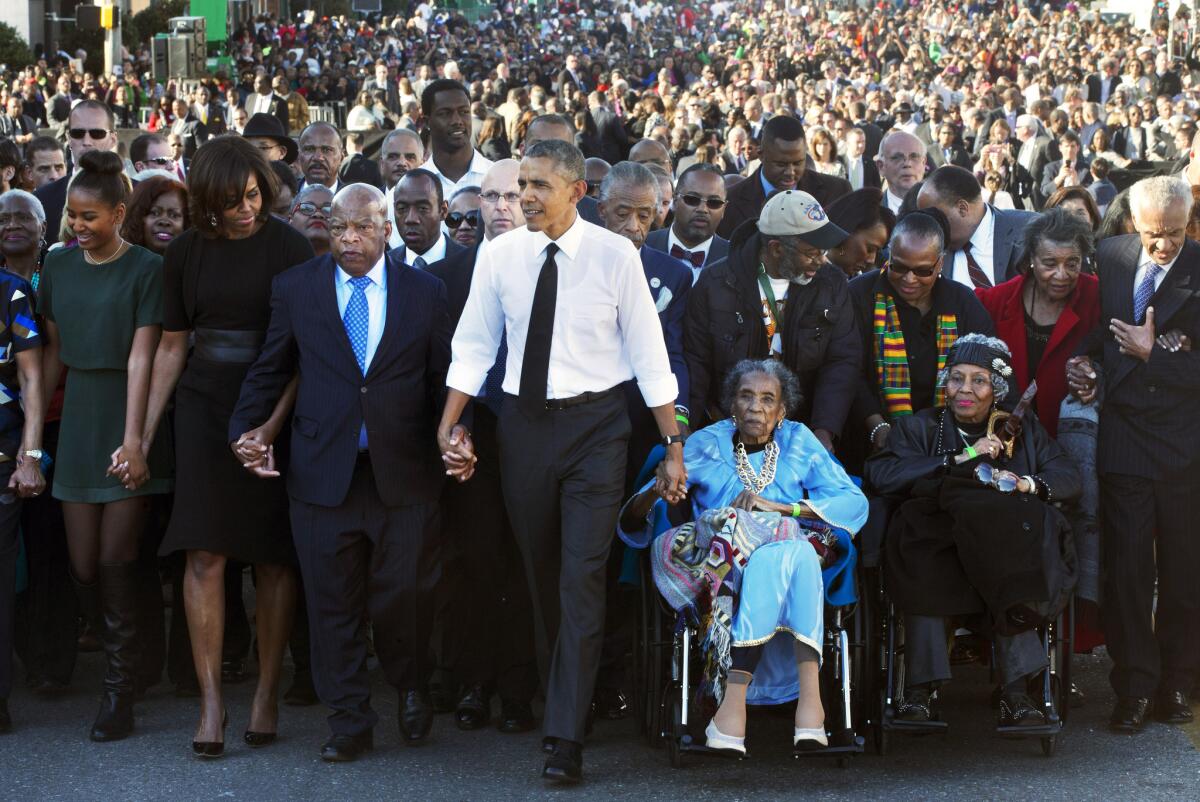Op-Ed: Celebrating Selma without fixing the Voting Rights Act dishonors the sacrifices of Bloody Sunday

- Share via
Long after he had left his career as a civil rights lawyer to become a justice on the Supreme Court, Thurgood Marshall described his 1944 success in a case striking down all-white primary elections in Texas as his “greatest victory.” This is an astonishing statement for a man who was the architect and chief litigator of the most important civil rights case of the 20th century, Brown vs. Board of Education. But Marshall recognized that breaking down the stranglehold on exclusive white political power was as crucial to defeating Southern white supremacy as dismantling segregation in education.
Despite Marshall’s victory in the Texas case, it took 20 years and the activism of thousands before the passage of the Voting Rights Act in 1965 provided the tools to protect the right of blacks to participate equally in the political process. On Saturday and Sunday, thousands converged on Selma, Ala., to commemorate March 7, 1965, “Bloody Sunday,” and the voting rights marches from Selma to Montgomery that led to the passage of the act.
But it is ironic that as Selma is commemorated this month, the Voting Rights Act lies critically wounded by a 2013 Supreme Court decision and that an effort to fix that damage cannot even get a hearing in Congress. Although the Voting Rights Act has been reauthorized three times with overwhelmingly bipartisan support, there is as yet no Republican co-sponsor for the Senate bill and there has been no hearing in the House on proposed bills that would restore what the Supreme Court destroyed.
The Voting Rights Act, which President Reagan called the crown jewel of civil rights legislation, was written to end not only existing voter discrimination but also new methods of disenfranchisement that might be devised in the future. It required jurisdictions with a history of voter discrimination to submit changes in their election rules to federal authorities for review. That system was in place for 48 years until the Supreme Court abruptly ended it in Shelby County (Alabama) vs. Holder, saying the “preclearance” sites and requirements were based on data and formulas that must be updated by Congress.
What happened in Texas from 1944 and Marshall’s win in the white-primary case through the passage of the 1965 act to today presents a clear picture of the arc of racial voter suppression in our country. Black and Latino disenfranchisement had been endemic in a state where, in response to every legal challenge to its whites-only practices, the Texas Democratic Party had succeeded in a series of moves and countermoves to reserve the system for white voters and white candidates.
But Marshall’s victory, and later the passage of the Voting Rights Act, began to usher in extraordinary changes in Texas. Barbara Jordan, the first black congresswoman from the South, was elected in 1972. She was instrumental in getting Texas covered by the preclearance provisions of the Voting Rights Act, starting in 1975. A host of black elected officials followed Jordan, but so did a host of voter discrimination practices that had to be challenged with the tools provided by the act.
And now Texas is once again at the forefront of efforts designed to keep people of color from full participation in the political process. In 2011, Texas passed a stringent law requiring voters to show certain kinds of ID before they could cast their ballots. The law was at first blocked under the Voting Rights Act preclearance procedures, but within hours of the Supreme Court’s 2013 decision overturning preclearance, the Texas attorney general announced plans to revive the ID law, which was in effect for the 2014 elections.
Among the law’s most eyebrow-raising provisions is one that prevents students at Texas’ state universities from using their school identification to vote but allows the use of a concealed-carry gun permit. It is estimated that more 600,000 registered voters in Texas — disproportionately black and Latino — lack the identification required by the law.
This harsh reality is the unfinished business of Selma. Without question, we must celebrate what happened there 50 years ago. We must honor and lift up the vision, sacrifice and courage of the activists led by Martin Luther King Jr. and by the members of the Student Nonviolent Coordinating Committee who literally put their lives on the line to bring true democracy to the South. But we must also demand that Americans of all races and all political parties come together again to restore the strength of the Voting Rights Act.
To celebrate the past without demanding that Congress take up amendments to the Voting Rights Act belittles and abandons the sacrifice of 1965. It dooms our children to repeat battles that their forebears so courageously fought and won.
Sherrilyn Ifill is the president and director-counsel of the NAACP Legal Defense and Educational Fund, a post Thurgood Marshall held from 1940 to 1961.
Follow the Opinion section on Twitter @latimesopinion and Facebook
More to Read
A cure for the common opinion
Get thought-provoking perspectives with our weekly newsletter.
You may occasionally receive promotional content from the Los Angeles Times.






